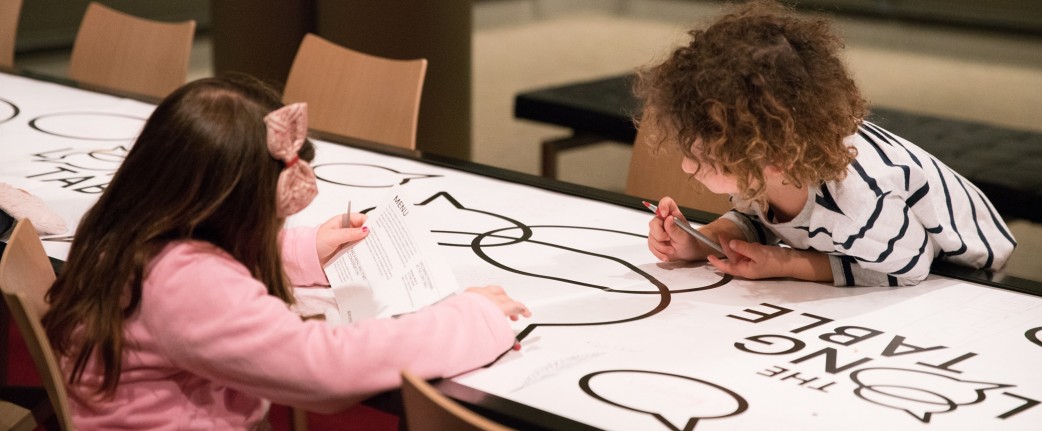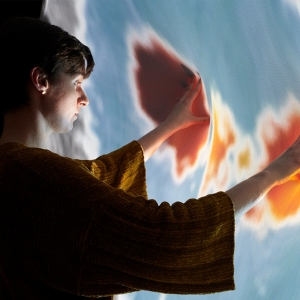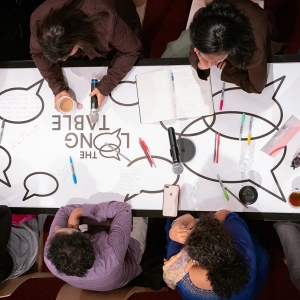
Throughout the Rubin’s Year of Power, we are hosting The Long Table, an open-source participatory project conceived by artist and activist Lois Weaver, which provides a forum for visitors and community groups to engage in a series of conversations on sharing power. In addition to being free and open to the public for self-serve pop-up discussions, the Rubin has partnered with local organizations to create audience-driven discussions on relevant, sometimes tricky topics.
Two of our community partners expressed their thoughts about the experience of sharing power at the Long Table—not only with the Museum but with strangers. Sara Auster, sound therapist, meditation teacher, and artist, brought the topic of Privilege and Power Dynamics in the Wellness Industry to the table, and Rinchen Dolma of YindaYin Coaching broached the subject of Education and the Future of Himalayan Immigrant Communities. They answered some of our questions about their experience.
The Long Table is supported by Shelley and Donald Rubin.
1) How did it feel to share among strangers? Did you find sharing your voice empowering? Liberating? Scary?

Sara: It felt energizing. One of my favorite things is having meaningful conversations with strangers. Starting the discussion with a group of people I knew set the tone of a comfortable space. I think that is what helped the attendees be more open to sharing their stories and perspectives.
Rinchen: I usually don’t feel comfortable sharing personal and intimate stories with strangers. However, for the Long Table, it felt refreshing and satisfying to share ideas and experiences with people who deeply care about education and youth empowerment in underserved communities.
2) How did the conversation compare with your expectations?
Sara: I didn’t know what to expect. However, I knew that the topic was both interesting and a bit controversial. There are many aspects of the wellness industry that are not discussed publicly, and this forum offered a safe space to dive in a little deeper. I expected that as the conversation continued participants would become more comfortable. The issues of physical and mental health, privatized health insurance, influencer/social media culture, inclusivity, and diversity all came up within our 45 minutes together.
Rinchen: In the beginning we weren’t sure how many people would show up because it coincided with some other important events. However, the conversation went per our expectations, and participants were deeply engaged on the topics.
3) What was your biggest takeaway from the discussion?

Sara: When each person was given the platform and opportunity to share and be heard, they became more attentive in their listening to others. We need more gatherings like this.
Rinchen: There are many people out there who care about the work that we are doing, and many of them are doing the same kind of work in their own community. In the future, we think there is a need for more collaborations and learnings from other organizations.
4) Has this conversation planted the seed for further conversation and action? Were any new partnerships or connections created?
Sara: There were all sorts of people represented at the table: an integrative nutritionist, a wellness publication editor, an acupuncturist, a health insurance representative, an arts educator, and more. At the end of the conversation people exchanged information to stay connected on a professional level, but they were also hugging and high-fiving each other. There are many ways we can continue to support and uplift each other. This was only the beginning.
Rinchen: In the past, we organized several events and workshops around the power of education and the future of the Himalayan communities in New York City at our center. This time at the Long Table, we were happy to connect with other organizations such as the Arab-American Family Support Center, who wanted to collaborate on future projects.
5) Why did you feel this conversation might be valuable to have at the Rubin as opposed to another location? How can the Rubin further support this conversation?
Sara: The Rubin has a reputation for being on the cutting edge of conscious living. With a focus on the arts and Buddhist traditions, the Rubin is naturally an institution that leads with compassion and grace. You can feel these things when you’re at the Museum and interacting with the staff. It was apparent that the attendees of the Long Table event all felt welcomed into the space.
Rinchen: The mission and goals of the Rubin are to preserve and promote the unique culture of the Himalayas. This is very important to us because we are trying to educate the younger generation of the Himalayan communities in New York City about the importance of their culture and heritage. In the process of educating the youth, we believe that we can find empowerment when an individual knows about his/her/their identity and takes pride in their heritage. Therefore, the Rubin is already a huge asset in bringing our communities closer to the home of their ancestors. Moreover, the Long Table itself was such a brilliant idea to bring people from across the board. The design of it provides a comfortable space for strangers to share deep conversations based on personal experiences, which is something that we can rarely find in places like New York City. The location and reputation of the Rubin have the power to bring diverse groups of people, and we are thankful for all the amazing opportunities and learning experiences that you provide to vulnerable communities.
About the Speakers
Sara Auster is a New York City–based sound therapist, meditation teacher and author of SOUND BATH: Meditate, Heal and Connect Through Listening. Sara has travelled the world to facilitate immersive Sound Bath experiences using the transformative power of sound and deep listening. From the boardrooms of Google to the galleries of MoMA, from hotels to hospitals, grade schools to Madison Square Garden, her work has been a driving force in bringing Sound Baths to modern culture. Sara’s thoughtfully-crafted experiences allow sound to be used as a tool to invite meditative states, support self-inquiry and cultivate deep relaxation. She is a thought leader on how to inspire meaningful connection through listening.
Rinchen Tara obtained her BA from Duke University in international comparative studies and is beginning her MA in education at Columbia University’s Teachers College this year. Born into a semi-farming family in Tibet, Rinchen is one of the first children in her region to attend school, let alone university. She believes that education should not be taken for granted, and she hopes to impart that respect for knowledge to her students.
Add Your Thoughts
Comments are moderated, and will not appear on this site until the Rubin has approved them.





I attended the Saturday, November 16th at 11 am for a Long Table Talk. Hosted by Museum Hue’s Stephanie A. Johnson-Cunningham, it was outstanding. My focus is on Ubuhlalu and Ukhamba, indigenous Nguni/Zulu art-forms of South Africa. When I think about the growing interest in African American and African art/art-forms, it makes me question the cultural paradigm based on power and wealth/money. Particularly where WEALTH in the African paradigm, is based on knowledge, not power/money. What I took away is the unspoken legacy; clash of cultures and values that inform approach. This includes culture and values that made colonization, enslavement (approaches), and institutional wealth; current day legacy/endowments we find in museums, sustainable.